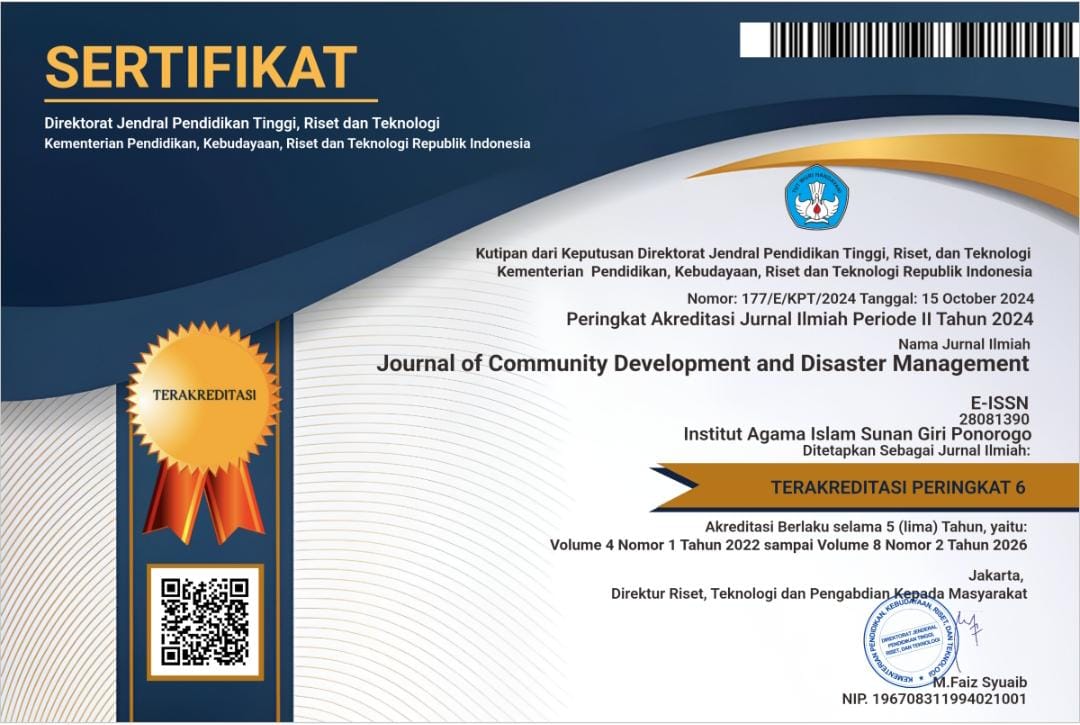Urgensi Pendidikan Pranikah dalam Internalisasi Nilai Ketaatan dan Pencegahan Nusyuz sebagai Upaya Mewujudkan Ketahanan Keluarga
The Urgency of Premarital Education in Internalizing the Value of Nusyuz Obedience and Prevention as an Effort to Realize Family Resilience
DOI:
https://doi.org/10.37680/jcd.v7i1.7690Keywords:
Premarital Education; Nusyuz; Obedience Values; Muslim Family.Abstract
The rising phenomenon of domestic conflicts, including nusyuz behavior, poses a serious challenge to modern Muslim family life. Nusyuz, which refers to a spouse's disobedience or failure to fulfill marital obligations, often stems from a lack of understanding regarding the rights and duties of husband and wife according to Islamic teachings. Premarital education serves as a crucial instrument in internalizing values of obedience, responsibility, and healthy communication within the household. This study aims to examine the urgency of premarital education as a preventive measure against nusyuz by emphasizing the internalization of Islamic values. The research employs a qualitative approach using library research methods, where data is collected from relevant primary and secondary sources, including classical Islamic jurisprudence texts (fiqh), academic journals, books on Islamic education, and policy documents from marriage institutions. The findings indicate that structured premarital education grounded in Islamic values can enhance prospective spouses’ awareness of the importance of religious obedience and their respective roles within the family. The internalization of obedience values through premarital education is also shown to strengthen the emotional and spiritual foundation of couples, thereby minimizing the potential for nusyuz. In conclusion, premarital education is not merely an administrative requirement before marriage, but an essential need in building a sakinah family that is free from destructive conflict.
References
Al-Biqa’i, I. (1995). Nazm al-Durar fi Tanasub al-Ayat wa al-Suwar (Vol. 2). Beirut: Dar al-Kutub al-‘Ilmiyyah, 180–181.
Ali, M. (2006). Menggugat Patriarki: Wacana Kesetaraan Gender dalam Islam, Yogyakarta: LKiS, 133–137.
Ansori, T. (2022). Penanggulangan Problematika Remaja Perspektif Dakwah. Ansoruna: Journal of Islam and Youth Movement, 1(1), 89-102.
Creswell, J. W. (2014). Research design: Qualitative, quantitative, and mixed methods approaches (4th ed.). Thousand Oaks, CA: SAGE Publications, 183-189.
Depag RI, Inpres Nomor 1 Tahun 1991 tentang Kompilasi Hukum Islam, (Derektorat Jendral Pengembangan Kelembagaan Agama Islam), Pasal 80 Ayat (7).
Ganim, S. (2000). Al-Nusyuz Bayna al-Zawjayn: Dirāsah Fiqhiyyah Muqāranah, Kairo: Dar al-Salam, 45–52.
Kementerian Agama Republik Indonesia. (2014). Petunjuk Teknis Kursus Pranikah. Jakarta: Direktorat Jenderal Bimbingan Masyarakat Islam, Kementerian Agama RI.
Keputusan Menteri Agama Republik Indonesia Nomor 892 Tahun 2019 tentang Penyelenggaraan Bimbingan Perkawinan bagi Calon Pengantin.
Komnas Perempuan. (2020). Catatan Tahunan Kekerasan terhadap Perempuan 2020, Jakarta: Komnas Perempuan, 17–20
Krippendorff, K. (2018). Content analysis: An introduction to its methodology (4th ed.). Thousand Oaks, CA: SAGE Publications, 22-24.
Moleong, L. J. (2014). Metodologi penelitian kualitatif (Edisi revisi). Bandung: Remaja Rosdakarya, 11-17.
Nasution, S. (2021). Paradigma Gender dalam Pendidikan Pranikah: Tinjauan Sosiologis terhadap Generasi Milenial. Jurnal Studi Gender dan Keluarga, 8(2), 121–138.
Nazili, M. A., & Anshori, M. (2024). Strategi Mengurangi Pernikahan Dini melalui Peningkatan Motivasi Belajar Siswa di MTs Miftahul Ulum Kalipang Kabupaten Pasuruan. PROGRESIF: Jurnal Dakwah, Sosial, dan Komunikasi, 1(2), 147-159.
Puslitbang Bimas Islam. (2020). Evaluasi Program Bimbingan Perkawinan bagi Calon Pengantin. Jakarta: Kementerian Agama RI.
Rahmawati, I. (2022). Efektivitas Program Bimbingan Pranikah terhadap Kesiapan Calon Pengantin dalam Menjalani Kehidupan Rumah Tangga. Jurnal Bimbingan Islam dan Keluarga, 10(1), 55–67.
Risnawaty, W. (2018). Urgensi Pendidikan Pranikah bagi Pasangan Calon Pengantin sebagai Upaya Mencegah Perceraian. Jurnal Sosial Keagamaan, 12(1), 45–56.
Syafiq Hasyim, Hal-hal yang Tak Terpikirkan tentang Isu-isu Keperempuanan dalam Islam, cet. III, (Yogyakarta: Mizan, 2001), hlm. 183.
Wahbah az-Zuhaili. (1989). Al-Fiqh al-Islami wa Adillatuhu (Vol. 7), Damaskus: Dar al-Fikr, 757–760.
Zed, M. (2008). Metode penelitian kepustakaan. Jakarta: Yayasan Obor Indonesia, 23-31.
Downloads
Published
How to Cite
Issue
Section
License
Copyright (c) 2025 Ashwab Mahasin

This work is licensed under a Creative Commons Attribution-ShareAlike 4.0 International License.
JCD: Journal of Community Development and Disaster Management rekomendasi pencipta untuk memegang hak cipta tanpa batasan dan batasan pencipta untuk memiliki hak publikasi tanpa batasan, juga pemilik hak komersial atas artikel tersebut adalah pencipta.










